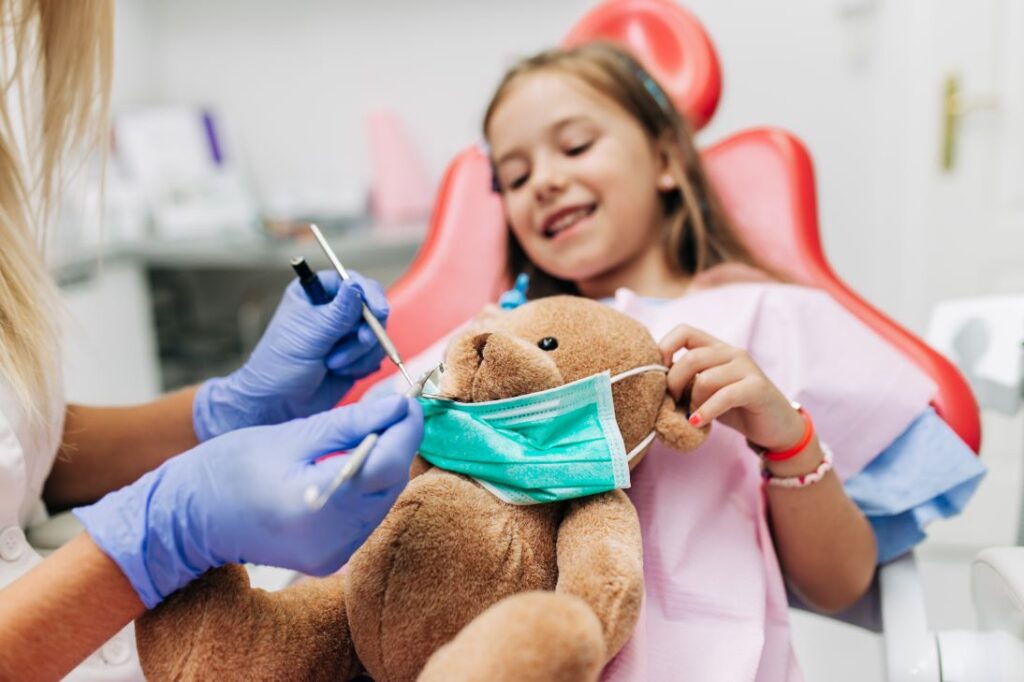
They may be small, but even kids can have big fears. Whether it’s monsters under the bed, apprehension about swimming, or anxiety about visiting the dentist, when your child is afraid, it can make even the most routine activities a challenge. Naturally, as a parent you want to ease their mind and bring them comfort. If they’re afraid of the dark, you can provide them with a nightlight. If they’re afraid of the water, they can wear a floatation device. But what happens when they need a dental exam? You can’t just let them skip their semi-annual checkup. Avoiding the dentist can worsen any existing dental problems, meaning by the time they do agree to a checkup, they may require more intervention than they would have if they’d gone sooner. This can in turn give them even more anxiety.
Thankfully, however, there is a solution. It’s called sedation dentistry, and it’s a safe and effective way to help ease some of your child’s dental anxiety so they feel relaxed enough to attend their dental appointment. Here’s how it works.
What is Sedation Dentistry?
Sedation dentistry is when your child’s dentist administers a sedative prior to their exam or procedure to lessen their anxiety. There are several types of sedation available, depending on how severe their symptoms are.
Nitrous Oxide
Nitrous oxide, or “laughing gas” is a gas that is administered through a mask that fits over the nose. It is colorless and slightly sweet-smelling and works within minutes. Nitrous oxide helps to calm anxiety but will keep your child fully conscious and alert so they can respond to questions and complete requests when prompted by the dentist, such as to open their mouth wider or bite down on a bite block. The effects only last while the patient is wearing the mask. Once the procedure is over, the dentist will give them pure oxygen for five minutes, which will help get the nitrous oxide out of their system and return them to their normal state.
Oral Conscious Sedation
Oral sedation is given via pill form prior to your child’s appointment. Oral sedation will not put them to sleep but will ease them into a state of relaxation. The effects last a bit longer than with nitrous oxide, making it ideal for longer or more complex procedures.
General Anesthesia
General anesthesia is used to treat children with severe anxiety. It is also a great option for kids who need a lot of dental work, or with physical or mental special needs. General anesthesia is administered intravenously and puts the patient to sleep for the duration of their appointment. In addition to the dentist working on your child’s mouth, an anesthesiologist or another qualified professional will remain in the room with them to monitor their vitals and determine when it is safe for them to return home.
Once their procedure is complete, the dentist will stop the sedative and allow your child to gradually wake up. While under its effects your child will be completely asleep and feel no discomfort. Upon waking, your child will likely be sleepy and will need to restrict activities for about 24 hours.
IV Sedation
The deepest form of conscious sedation, IV sedation administers a sedative directly to the child’s bloodstream. IV sedation works very quickly and is recommended for children who have severe dental anxiety, require multiple procedures, or have behavioral issues. Like general anesthesia, it is also monitored by a second professional who will remain in the room during the appointment.
If your child struggles with dental anxiety, help put their mind at ease during their next appointment. Speak to your dentist about the benefits of sedation dentistry today.
About Our Practice
At Glen Ellyn Pediatric Dentistry, we want your child to feel comfortable going to the dentist. From our fun, kid-friendly atmosphere to a variety of sedation dentistry options, it is our goal to make their time with us a pleasant experience, so they don’t have negative feelings about caring for their oral health.
If you’re interested in learning more about sedation dentistry for your child, please visit our website and schedule an appointment, or call us at 630-756-5151.
